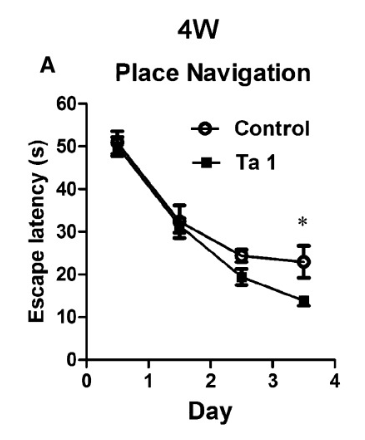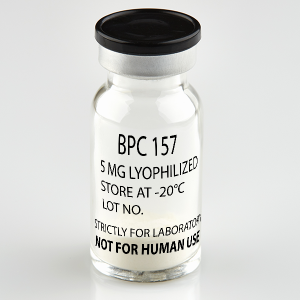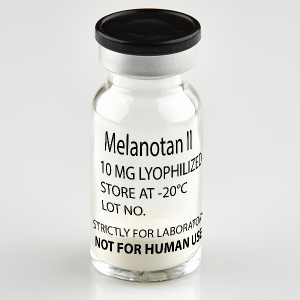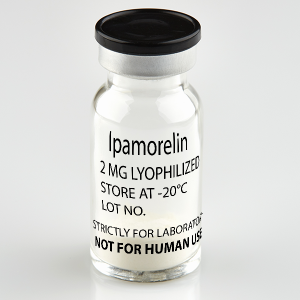Thymosin Alpha-1 Research
Thymosin Alpha-1 Modulates the Immune System
Thymosin alpha-1, first isolated from tissue of the thymus gland, is a potent regulator of immune function. The thymus is responsible for making T-cells and for ensuring that they mature properly. T-cells are some of the most important parts of the adaptive immune system, where they help the immune system remember past infections and improve the function of other immune system cells to boost their ability to fight infection.
Research in mice without thymus glands shows that thymosin alpha-1 alone is enough to restore immune function and prevent widespread infection. The peptide works at the most fundamental levels of the immune system to activate signaling pathways and stimulate the production of cytokines and other molecules that help to coordinate the activities of various cells in the immune system[1]. In other words, thymosin alpha-1 has broad, positive effects on the immune system.
One way in which thymosin alpha-1 may be of benefit is in vaccine construction. Right now, many vaccines consist of inactivated (killed) pathogens because administering live pathogens, even when they are weakened, is risky. Unfortunately, inactivated vaccines are less effective and thus immunity is not as great. Thymosin alpha-1 may solve this problem by boosting the response of the immune system to inactivated vaccines. The net results would included not only boosted immunity, but longer duration of immunity[2]. This may be of benefit, particularly in the setting of severe disease like avian influenza, HIV, and more.
Another way in which the ability of thymosin alpha-1 to regulate the immune system may be of benefit is in the setting of sepsis. Sepsis is a life-threatening condition caused by an over-inflated immune response to infection. The ability to regulate the immune response in this setting could save lives and prevent organ damage. Research suggests that thymosin alpha-1 lowers mortality in patients with sepsis and reduced long-term complications[3]. Though ongoing research is needed, the early results suggest that thymosin alpha-1 may soon be approved as an adjuvant therapy for sepsis.
Thymosin Alpha-1 Promotes Nerve Growth
The immune system plays very important roles in the growth, development, and maintenance of the central nervous system, particularly the brains of developing mammals. Research in mice indicates thymosin alpha-1 is a prominent potentiator of neurodevelopment and that peripheral administration of the peptide can actually boost cognitive function. It appears that thymosin alpha-1 affects a number of genes responsible for neuron growth and the development connections between neurons. The peptide alters the environment within the nervous system to favor growth and develop while simultaneously blocking pathways responsible for inflammation and neuron dysfunction[4]. In short, thymosin alpha-1 actually improves brain structure and function. There is interest in using the molecule to address neurodevelopmental delays, such as those associated with cerebral palsy.
A. 4-week-old mice given thymosin alpha-1 learn how to escape from mazes faster.
Source: PubMed
Thymosin Alpha-1 Fights Fungus
Dendritic cells, a specific type of cell in the immune system, are important in helping the immune system to recognize fungal infections. Thymosin alpha-1 has been shown to induce maturation of dendritic cells, thereby boosting the ability of the immune system to fight fungal infections[5]. The peptide has also been found to activate T-helper cells in mouse models of aspergillus infection, a type of server fungus. Scientists hope to use thymosin alpha-1 as an adjuvant therapy to boost the effectiveness of standard anti-fungal treatments.
The role of thymosin alpha-1 in regulating dendritic cells cannot be overstated. Dendritic cells are responsible for taking antigens, bits of invading bugs like bacteria and fungi, and presenting them to other immune system cells in a way that makes it easy for those cells to recognize the antigens and respond appropriately. Dendritic cells are found in high numbers in the skin, nose, lungs, and GI system where they act as one of the first responders of the immune system. By regulating dendritic cells, thymosin alpha-1 affects immune system functioning at one of its most fundamental levels[6].
Thymosin Alpha-1 and Hepatitis
Thymosin alpha-1 is an effective and highly affordable treatment against chronic hepatitis B and C infections. It is also an effective immune stimulant and can be co-administered with vaccines for both viruses to improve efficacy. Thymosin alpha-1 is currently approved for treatment of hepatitis B and C in over 35 different countries[7].
Thymosin Alpha-1 and HIV
Even though antiretroviral therapy has come a long way since HIV was first discovered in the 1980s, complete restoration of immune function is still not possible. Oddly enough, antiretroviral therapy itself has been linked to certain deficits in the immune response (particularly cytotoxic T-cells) as well as to persistent inflammatory conditions. Research shows that thymosin alpha-1 may be of benefit in this particular population, helping to restore immune regulation and improving overall quality of life for individuals taking highly active antiretroviral therapy (HAART)[8].
Interestingly, thymosin alpha-1 may also boost the ability of the body to fight HIV infection. It appears that the peptide stimulates CD8 T-cells to release a number of factors that inhibit HIV infection of other immune cells and prevent latent HIV from becoming active[9].
Thymosin Alpha-1 Research and Blood Pressure
New research indicates that thymosin alpha-1 blocks angiotensin converting enzyme (ACE) and thus can reduce blood pressure[10]. ACE is a common target of prescription drugs, like lisinopril, in certain individuals with high blood pressure. Inhibition of ACE has been shown to not only lower blood pressure by relaxing blood vessels, but can also reduce cardiac remodeling, slow the progression of atherosclerosis (plaque buildup), and improve kidney function. Unfortunately, most ACE inhibitors come with a number of side effects. It is possible that thymosin alpha-1 may offer the benefits of ACE inhibition without the side effects caused by currently available drugs.
Thymosin Alpha-1 Research and Cancer
Research using human lung cancer cells (A549) indicates that thymosin alpha-1 has anti-proliferative effects, reducing both the growth and metastasis of cancerous cells. The peptide also appears to reduce cell migration, which can help to reduce penetration of cancer cells into surrounding tissue (i.e. invasion)[11].
Research combining thymosin alpha-1 with dacarbazine, a common chemotherapy, showed an increase in progression-free survival rates and no increase in rates of toxicity[12], [13]. This indicates that thymosin alpha-1 boosts the effects of the chemotherapy in reducing cell proliferation. Given the peptide’s natural occurrence, it isn’t unreasonable to speculate that it may one day form part of the basis of a cancer vaccine designed to prevent tumor development rather than treat cancer after it has already occurred.
Recently, scientists developed a long-acting version of thymosin alpha-1 and tested it against breast cancer cells in mice. Results showed that the modified thymosin alpha-1 molecule was even more effective in inhibiting growth of breast cancer cells. The modified peptide appeared to boost levels of CD4 and CD8 cells while simultaneously increasing interferon gamma and interleukin-2 levels. This was particularly important in patients being treated with steroids for the swelling caused by certain cancers[14], [15].
Thymosin alpha-1 has been tested and is undergoing active testing in a number of different cancers. Positive results have been seen in
- breast cancer,
- melanoma,
- liver cancer,
- lung cancer, and
- colon cancer.
Thymosin Alpha-1 Research and Inflammatory Pain
Inflammatory pain is transmitted through specific pathways in the peripheral and central nervous system. Given the strong anti-inflammatory effects of thymosin alpha-1, scientists speculated that the molecule could effectively reduce pain as well. Research in mice suggests that this is indeed true and has even identified the specific pathways that thymosin alpha-1 interferes with. It turns out that thymosin alpha-1 acts directly at the sight of inflammation to reduce the production of cytokines and other molecules (e.g. TNF-alpha, IL-1beta, etc.) that trigger pain in the first place[16]. This mechanism of action is drastically different from typical anti-inflammatory pain relievers and may offer improved pain relief with fewer side effects than existing drugs.
Thymosin Alpha-1 and Cystic Fibrosis
One of the primary complications of cystic fibrosis (CF) is rampant inflammation that leads to poor mucous clearance, increased rates of infection, and other problems. All of these problems stem from a mis-folding of a specific protein called CFTR. Research indicates that thymosin alpha-1 can reduce inflammation and even improve function of the CFTR protein[17]. There is hope that the peptide may offer an effective single-molecule therapeutic approach to treating CF.
Damaged Teeth and Thymosin Alpha-1
Research into the benefits of thymosin alpha-1 in the setting of avulsed (pulled out) and replanted permanent front teeth indicates that the peptide can improve healing of the gums and soft tissue surrounding the injury and promotes survival of the replanted tooth[18]. Though more research is required, the findings indicate that thymosin alpha-1 may be of huge benefit in the setting of traumatic tooth damage, making it easier for dentists to rescue teeth that have been knocked out.
The Future of Thymosin Alpha-1
The potential applications of thymosin alpha-1 are too numerous to list in any reasonable summary. What is notable, however, is that the peptide is already being used in a number of countries as a legitimate medical treatment. Researchers are currently looking at ways to improve the efficacy of the peptide and produce it faster and more affordably[19]. There is good reason to believe that thymosin alpha-1 variants will be investigated in clinical trials for a number of conditions in the coming years. From cancer to infection, the peptide has shown great promise as an immune system modulator with few side effects.
References
- [1] R. King and C. Tuthill, “Immune Modulation with Thymosin Alpha 1 Treatment,” Vitam. Horm., vol. 102, pp. 151–178, 2016.
- [2] C. Zhang, J. Zhou, K. Cai, W. Zhang, C. Liao, and C. Wang, “Gene cloning, expression and immune adjuvant properties of the recombinant fusion peptide Tα1-BLP on avian influenza inactivate virus vaccine,” Microb. Pathog., vol. 120, pp. 147–154, Jul. 2018.
- [3] F. Pei, X. Guan, and J. Wu, “Thymosin alpha 1 treatment for patients with sepsis,” Expert Opin. Biol. Ther., vol. 18, no. sup1, pp. 71–76, 2018.
- [4] G. Wang et al., “Immunopotentiator Thymosin Alpha-1 Promotes Neurogenesis and Cognition in the Developing Mouse via a Systemic Th1 Bias,” Neurosci. Bull., vol. 33, no. 6, pp. 675–684, Dec. 2017.
- [5] L. Romani et al., “Thymosin α 1 activates dendritic cells for antifungal Th1 resistance through Toll-like receptor signaling,” Blood, vol. 103, no. 11, pp. 4232–4239, Jun. 2004.
- [6] L. Romani et al., “Thymosin alpha1: an endogenous regulator of inflammation, immunity, and tolerance,” Ann. N. Y. Acad. Sci., vol. 1112, pp. 326–338, Sep. 2007.
- [7] A. L. Goldstein and A. L. Goldstein, “From lab to bedside: emerging clinical applications of thymosin alpha 1,” Expert Opin. Biol. Ther., vol. 9, no. 5, pp. 593–608, May 2009.
- [8] C. Matteucci et al., “Thymosin alpha 1 and HIV-1: recent advances and future perspectives,” Future Microbiol., vol. 12, pp. 141–155, 2017.
- [9] C. Matteucci et al., “Thymosin α 1 potentiates the release by CD8(+) cells of soluble factors able to inhibit HIV-1 and human T lymphotropic virus 1 infection in vitro,” Expert Opin. Biol. Ther., vol. 15 Suppl 1, pp. S83-100, 2015.
- [10] J. Kharazmi-Khorassani, A. Asoodeh, and H. Tanzadehpanah, “Antioxidant and angiotensin-converting enzyme (ACE) inhibitory activity of thymosin alpha-1 (Thα1) peptide,” Bioorganic Chem., vol. 87, pp. 743–752, Jun. 2019.
- [11] J. Kharazmi-Khorassani and A. Asoodeh, “Thymosin alpha-1; a natural peptide inhibits cellular proliferation, cell migration, the level of reactive oxygen species and promotes the activity of antioxidant enzymes in human lung epithelial adenocarcinoma cell line (A549),” Environ. Toxicol., May 2019.
- [12] M. Maio et al., “Large randomized study of thymosin alpha 1, interferon alfa, or both in combination with dacarbazine in patients with metastatic melanoma,” J. Clin. Oncol. Off. J. Am. Soc. Clin. Oncol., vol. 28, no. 10, pp. 1780–1787, Apr. 2010.
- [13] R. Danielli, E. Fonsatti, L. Calabrò, A. M. Di Giacomo, and M. Maio, “Thymosin α1 in melanoma: from the clinical trial setting to the daily practice and beyond,” Ann. N. Y. Acad. Sci., vol. 1270, pp. 8–12, Oct. 2012.
- [14] X. Shen et al., “Generation of a novel long-acting thymosin alpha1-Fc fusion protein and its efficacy for the inhibition of breast cancer in vivo,” Biomed. Pharmacother. Biomedecine Pharmacother., vol. 108, pp. 610–617, Dec. 2018.
- [15] F. Wang, T. Yu, H. Zheng, and X. Lao, “Thymosin Alpha1-Fc Modulates the Immune System and Down-regulates the Progression of Melanoma and Breast Cancer with a Prolonged Half-life,” Sci. Rep., vol. 8, no. 1, p. 12351, Aug. 2018.
- [16] Y. Xu et al., “Thymosin Alpha-1 Inhibits Complete Freund’s Adjuvant-Induced Pain and Production of Microglia-Mediated Pro-inflammatory Cytokines in Spinal Cord,” Neurosci. Bull., Feb. 2019.
- [17] L. Romani et al., “Thymosin α1 represents a potential potent single-molecule-based therapy for cystic fibrosis,” Nat. Med., vol. 23, no. 5, pp. 590–600, May 2017.
- [18] P. F. Day, M. Duggal, and H. Nazzal, “Interventions for treating traumatised permanent front teeth: avulsed (knocked out) and replanted,” Cochrane Database Syst. Rev., vol. 2, p. CD006542, 05 2019.
- [19] M. Schmidt et al., “Design of a substrate-tailored peptiligase variant for the efficient synthesis of thymosin-α1,” Org. Biomol. Chem., vol. 16, no. 4, pp. 609–618, 24 2018.






